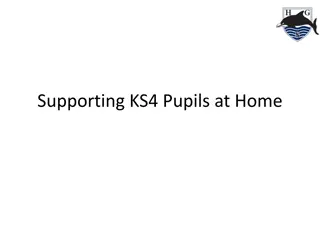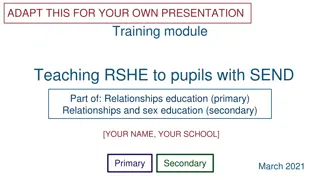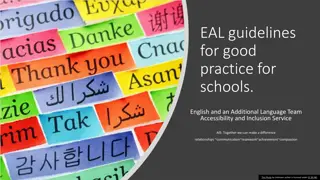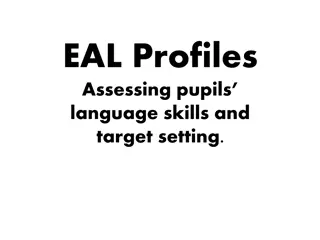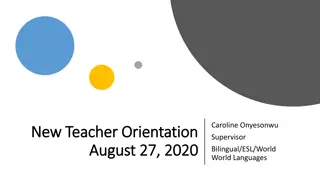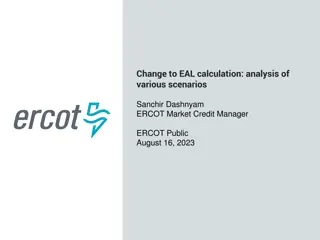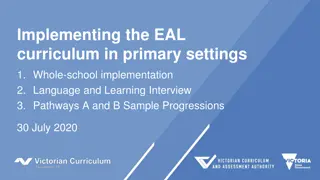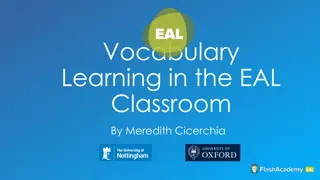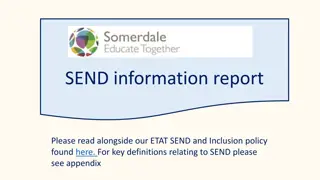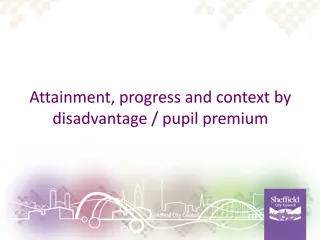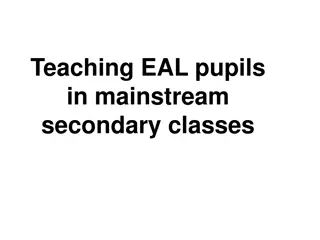Supporting Pupils with English as an Additional Language (EAL) - Strategies and Insights
Understanding and supporting pupils with English as an Additional Language (EAL) is essential for educators. Prue Reynolds, an EMA consultant, emphasizes the importance of recognizing the diversity and unique backgrounds of EAL learners. The materials provided offer insights into identifying EAL pupils, gathering information about them, and assessing their language proficiency levels. Additionally, the guidance from Ofsted for inspectors sheds light on the significance of considering various factors in interpreting the achievements and challenges faced by EAL students.
Download Presentation

Please find below an Image/Link to download the presentation.
The content on the website is provided AS IS for your information and personal use only. It may not be sold, licensed, or shared on other websites without obtaining consent from the author.If you encounter any issues during the download, it is possible that the publisher has removed the file from their server.
You are allowed to download the files provided on this website for personal or commercial use, subject to the condition that they are used lawfully. All files are the property of their respective owners.
The content on the website is provided AS IS for your information and personal use only. It may not be sold, licensed, or shared on other websites without obtaining consent from the author.
E N D
Presentation Transcript
Supporting pupils with English as an Additional Language (EAL) Prue Reynolds EMA Consultant prue.reynolds96@gmail.com
Pupil Voices Video clip https://vimeo.com/276470810
Pupils with EAL According to Ofsted s guidance for inspectors: Pupils with English as an additional language refers to learners whose first language is not English. The learners may already be fluent in several other languages or dialects. Pupils learning EAL are not a homogeneous group. .they come from diverse linguistic, cultural and educational backgrounds. These variations are significant when interpreting the overall attainment and achievement of EAL learners
Children of families who have moved from other area of UK Children of students at universities and colleges New arrivals New arrivals EAL pupils in EAL pupils in your school your school Refugees & asylum seekers Children born in the area Children of mixed/dual language/ heritage backgrounds Children of families newly arrived in UK
How well do you know your pupils? What do you know about the following? family, language history, length of time in the UK, previous schooling, favourite subjects personal interests strengths
Pupils with EAL From September 2016, all schools needed to inform the government of each child s country of birth, nationality and level of proficiency in English. (Almost one in 5 pupils are classed as having English as an Additional Language (EAL) Schools were required to assess the position of pupils with EAL against a 5 point scale (A-E) combining their reading, written and spoken language to make a best fit judgement and to provide a snapshot of information about the numbers of pupils who are learning English The new levels (A-E) were based on the Welsh system.
EAL levels A-E A New to English - The pupil may: Use first language for learning and other purposes Remain completely silent in the classroom Be copying/repeating some words and phrases Understand some everyday expressions in English, but may have minimal or no literacy in English These pupils will need a considerable amount of EAL support
EAL levels A-E B Early acquisition - The pupil may: Follow day to day communication in English and participate in learning activities with support Begin to use spoken English for social purposes Understand simple instructions and can follow narrative/accounts with visual support Have developed some skills in reading and writing Have become familiar with some subject specific vocabulary Still needs a significantamount of EAL support to access the curriculum
EAL levels A-E C Developing competence. The pupil may: Participate in learning activities with increasing independence Be able to express self orally in English, but structural inaccuracies are still apparent Be able to follow abstract concepts and more complex written English Literacy will require ongoing support, particularly for understanding text and writing Requires ongoing EAL support to access curriculum fully
EAL levels - A-E D Competent Oral English developing well, enabling engagement in activities across the curriculum Can read and understand a wide variety of texts Written English may lack complexity and contain occasional evidence of errors in structure Needs some support to access subtle nuances of meaning, to refine English usage and to develop abstract vocabulary Needs some/occasional EAL support to access complex curriculum materials and tasks
EAL levels A-E E Fluent Can operate across the curriculum to a level of competence equivalent to a pupil who uses English as a first language Operates without EAL support across the curriculum
Teachers Standards - Standard 5 Adapt teaching to respond to the strengths and needs of all pupils Know when and how to differentiate appropriately, using approaches which enable pupils to be taught effectively Have a secure understanding of how a range of factors can inhibit pupils ability to learn, and how best to overcome these Demonstrate an awareness of the physical, social and intellectual development of children, and know how to adapt teaching to support pupils education at different stages of development Have a clear understanding of the needs of all pupils, including those with English as an additional language; those with disabilities; and be able to use and evaluate distinctive approaches to engage and support them
Assessment When comparing pupils you need the pupil s previous history. If the pupil has had schooling prior to coming to the UK the pupil will be bringing their prior knowledge to bear on their learning. There are a number of different assessment models used by schools and it will be important that whichever system you use needs to link to the school s system.
Pupil observations to inform assessment Even during the induction period it will be valuable to keep a record of the EAL pupil s efforts to make sense of all that is taking place both inside and outside the classroom. First steps in conversation often occur in the more informal settings of the playground or the dining hall. Ongoing assessment informs planning and choice of support strategies.
Why assess first language? It is important to be aware of the EAL pupil s skills in first language if you are to avoid the mistake of assuming that such a pupil with little or no English has limited language. An all-too frequent consequence is that the pupil is then placed in settings with pupils of lower ability who risk providing less than effective language modelling for the new arrival.
CAN YOU READ DUTCH? Ik lees graag Ik heet Irene en ik lees graag. Ik lees graag longe boeken. Ik lees graag korte boeken. Ik lees graag grappige boeken. Ik lees graag verdrietige boeken. Ik lees graag boeken met platjes. Ik lees gewoon graag.
HOW IS YOUR CALP? Compute not your immature gallinaceans prior to the puncture of their brittle epidermis Cleave gramineous matter for fodder during the period in which the orb of the day is refulgent Every substance which coruscates is not fashioned from aureate material
BICS & CALP Responds to everyday questions, instructions and comments Responds to a wider variety of questions, instructions, jokes, idiomatic language, etc Uses subject vocabulary, precise terms and specialised terminology Limited, non-technical vocabulary Produces complex sentences and well-constructed arguments Regular grammatical errors Listens for short bursts Listens extensively and extracts meanings Can talk coherently at length and produces well-constructed arguments Takes short turns as a speaker Has the mechanics of reading but limited comprehension Literal and inferential reading skills Writing reflects speech Can write using a range of genres Finds working independently difficult Can work independently
DARTS DIRECTED ACTIVITES RELATED TO TEXTS Concerns about Communi Card sort Charts and Grids Dictoglos Key vocabulary including useful phrases Cloze procedure Labelling/diagram completion Graphic organisers 26
BLOOMS REVISED TAXONOMY Original Terms New Terms Creating Evaluation Evaluating Synthesis Analysing Analysis Applying Application Understanding Comprehension Remembering Knowledge (Based on Pohl, 2000, Learning to Think, Thinking to Learn, p. 8) Original and New terms based on Pohl By Kurwongbah State School, Australia
USEFUL WEBSITES C Mantra Lingua Collaborative Learning www.mantralingua.com collaborativelearning .org Show Racism the Red Card NALDIC www.theredcard.org www.naldic.org.uk Stonewall Bell Foundation www.stonewall.org.uk www.bellfoundation.org.uk


